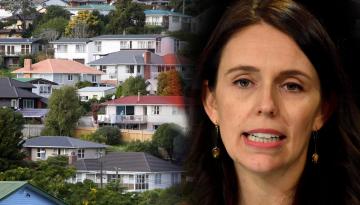PHOTO: NZ house prices have been out of control for too long. FILE GETTY
While New Zealand’s house prices may be dropping lately, for the past two decades they’ve been on a one-way trajectory – up.
Since 2000 median house prices have shot up from around $170,000 to a whopping $810,000 in July 2022.
Now a new paper has revealed what really drove prices up so quickly. The joint paper by Te Tai Ōhanga, Te Tūāpapa Kura Kāinga and Te Pūtea Matua was published on Thursday.
The joint paper was authored by the Housing Technical Working Group, a joint initiative of the three agencies, that was established to improve the country’s technical understanding of the housing market.
GOT A STORY FOR US?
It looked into the key drivers of the housing market over the last 20 years and found a combination of global interest rates falling, the tax system and land restrictions were the main causes.
Housing Technical Working Group chair Dominick Stephens said the assessment focused on the Hamilton and Waikato area to draw insights for the rest of the country.
“The key conclusion is that a combination of a global fall in interest rates, the tax system, and restrictions on the supply of land for urban use were the main cause of higher house prices in Aotearoa New Zealand over the past 20 years,” Stephens said.
Factors such as population growth and construction costs played a more modest role, the report found. Instead, Stephens said the global decline in interest rates inevitably led to a sustained reduction in borrowing costs in New Zealand and increased demand to buy houses.
“If land supply had been more responsive this would have sparked a larger housing supply response, moderating any initial lift in house prices and putting downward pressure on rents.
“Instead, restrictions to land supply meant that much of the fall in interest rates was capitalised into, or captured by, higher urban land prices.
“Higher urban land prices led to higher house prices without increasing the incentive to build dwellings,” he said.
The report also noted when land supply is restricted, changes to the tax system tend to affect the value of urban land rather than supply or rents.
“The three agencies are committed to better understanding the interlinkages between the economy, government policy, monetary policy and the housing market, with a particular focus on social wellbeing.
“Our commitment is grounded in the vision and outcomes set out in the Government Policy Statement on Housing and Urban Development (GPS-HUD) released last year.
“While the paper today contained an assessment of what has happened, a lot is changing. Urban planning is being reformed to free up land supply and tax settings have been changed for investors,” Stephens said.
It comes after a recent CoreLogic report revealed New Zealand’s housing market has reached a major turning point, with a drop in the number of houses sold that made a gross profit.
The company’s latest Pain and Gain report, which was released on Tuesday, found the housing market has lost some of its steam post-COVID-19.
In the three months to June 2022, 98.1 percent of property resales made a gross profit – where the sale price was above the original purchase price – or gain, down from 99.1 percent in quarter one and 99.3 percent in quarter four 2021.
It comes as house prices have been dropping for several months after the Reserve Bank hiked the Official Cash Rate in an effort to dampen sky-high inflation. But even with the decreases, house prices are still well above where they were at this time last year.
READ MORE VIA NEWSHUB
MOST POPULAR
 EX – Superstar real estate agent JAILED
EX – Superstar real estate agent JAILED BE AWARE REAL ESTATE AGENTS: It’s Now Illegal To Ignore ‘Do Not Knock’ Stickers
BE AWARE REAL ESTATE AGENTS: It’s Now Illegal To Ignore ‘Do Not Knock’ Stickers Why glamorous mother-of-two had to change her name and move house
Why glamorous mother-of-two had to change her name and move house WINNER: 2022 #1 international real estate salesperson
WINNER: 2022 #1 international real estate salesperson NBR rich list 2022
NBR rich list 2022 HOUSING MARKET: ‘The turning point has arrived’
HOUSING MARKET: ‘The turning point has arrived’ Give that man a beer: Owning 51 properties by the age of 26
Give that man a beer: Owning 51 properties by the age of 26 New kiwi Property TV Show: RICH LISTERS
New kiwi Property TV Show: RICH LISTERS Abandoned land for sale
Abandoned land for sale Former All Black captain’s new role as a Property Group Brand Ambassador
Former All Black captain’s new role as a Property Group Brand Ambassador
















